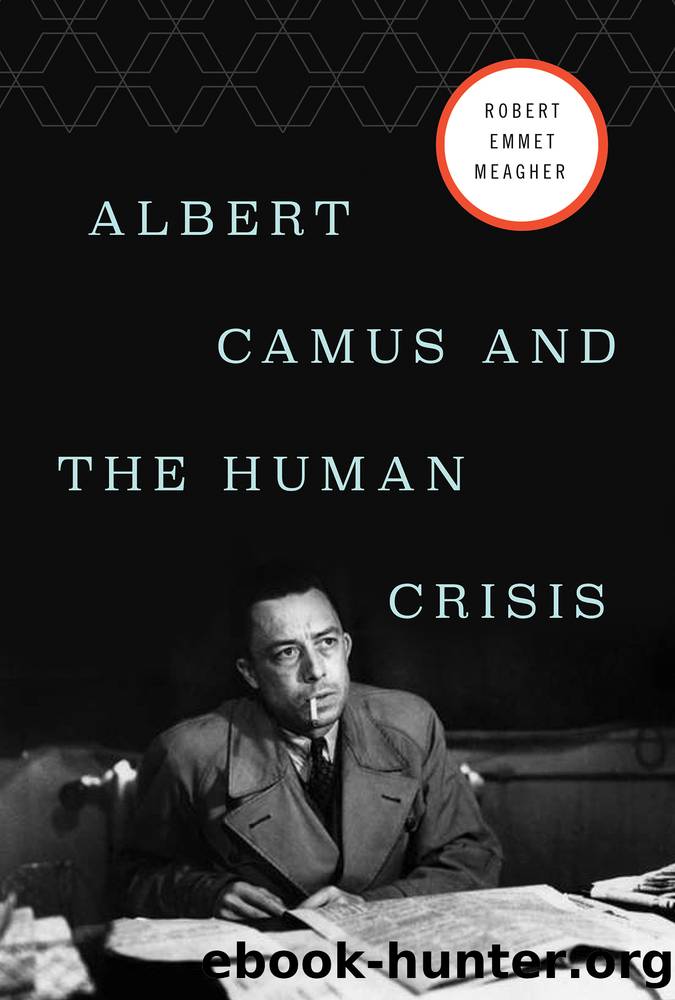Albert Camus and the Human Crisis by Robert E. Meagher

Author:Robert E. Meagher [Meagher, Robert E.]
Language: eng
Format: epub
Tags: Biography & Autobiography, Literary Figures, Rich & Famous, Historical
ISBN: 9781643138220
Google: BNMYEAAAQBAJ
Publisher: Simon and Schuster
Published: 2021-11-02T23:35:58.169441+00:00
As with Meursault and Marie, swimming occasions their first moment of shared sensuousness. âFor some minutes they swam side by side, with some zest, in the same rhythm, isolated from the world, and at last free of the town and of the plague.â24 In The Stranger, Meursault and Marieâs swim was a prelude to their union as lovers. Here, Rieux and Tarrouâs moonlit swim marks the culmination of their bond as friends. Either way it is a matter of communion.
Each of the central melodies in The Plague follows a similar pattern, from consciousness to activism. We hear or see, in real time or memory, how each of the plague fighters, again with the exception of Grand, came to plague consciousness and moved from there to taking action. Rieux and Tarrou each explains that he recognized the plague and resolved to resist it well before pestilence came to Oran and closed the city. Rieux was already a physician, under oath to do no harm and to attend to othersâ wounds and afflictions. This much is to be expected of a doctor. What Tarrou wondered at was the intense fervor with which Rieux gave himself to his calling. âWhy,â he asked Rieux, âdo you yourself show such devotion, considering you donât believe in God?âIV This is of urgent interest to Tarrou, who aspires beyond all else to be a âsaint without God.â25 The point here for Rieux was that âif he believed in an all-powerful God, he would cease curing the sick and leave that to Him.â26 He was âoutraged by the whole scheme of thingsâ and was âfighting against creation as he found it.â27 What taught Rieux this was watching people suffer and die in an indifferent universe. The truth was just that simple and obdurate: âMen die and they are not happy,â28 and Rieuxâs labors to resist its weight meant, like those of Sisyphus, âa never-ending defeat.â29
Tarrou, too, as a young man outraged by the scheme of things, came to see that his world is âshaped by death.â Not just by mortality, but even more outrageously by murder. This is the death that human beingsâdriven by hatred, greed, ambition, prejudice, ideology, and ignoranceâinflict on each other, counting on a numberless supporting cast of indifferent bystanders. For Tarrou, the founder of the sanitary groups, âthe most incorrigible viceâ is âthat of an ignorance that fancies it knows everything and therefore claims for itself the right to kill.â30 To his great horror, it was that same murderous ignorance that Tarrou, in his youth, found seething in his father, who âto all appearances was a kindly, good-natured man⦠a very decent man as men go.â31 Tarrouâs father, an esteemed prosecuting attorney, apart from mastering the French criminal code, obsessively studied train schedules and committed them to memory. Not that he was a frequent traveler, any more than he was a criminal. He dwelt happily in a world of abstractions, and in the satisfaction that trains ran on time and that the wheels of justice turned smoothly.
Download
This site does not store any files on its server. We only index and link to content provided by other sites. Please contact the content providers to delete copyright contents if any and email us, we'll remove relevant links or contents immediately.
Machine Learning at Scale with H2O by Gregory Keys | David Whiting(4292)
Never by Ken Follett(3935)
Harry Potter and the Goblet Of Fire by J.K. Rowling(3847)
Unfinished: A Memoir by Priyanka Chopra Jonas(3379)
Fairy Tale by Stephen King(3368)
The Man Who Died Twice by Richard Osman(3070)
Will by Will Smith(2906)
Rationality by Steven Pinker(2350)
It Starts With Us (It Ends with Us #2) by Colleen Hoover(2338)
Can't Hurt Me: Master Your Mind and Defy the Odds - Clean Edition by David Goggins(2320)
The Dark Hours by Michael Connelly(2300)
The Storyteller by Dave Grohl(2227)
Friends, Lovers, and the Big Terrible Thing by Matthew Perry(2219)
The Becoming by Nora Roberts(2188)
The Dawn of Everything: A New History of Humanity by David Graeber & David Wengrow(2187)
The Stranger in the Lifeboat by Mitch Albom(2113)
Cloud Cuckoo Land by Anthony Doerr(2098)
Love on the Brain by Ali Hazelwood(2059)
Einstein: His Life and Universe by Walter Isaacson(2009)
